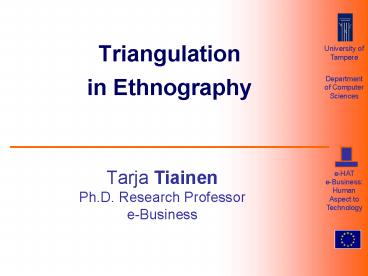Triangulation in Ethnography - PowerPoint PPT Presentation
1 / 16
Title:
Triangulation in Ethnography
Description:
Principle of Interaction between the Researchers and the Subjects ... Tarja Minna Tero Tarja Taina. Tiainen Paakki Saarenp Katajam ki Kaapu. Ky sti Pennanen ... – PowerPoint PPT presentation
Number of Views:434
Avg rating:3.0/5.0
Title: Triangulation in Ethnography
1
Triangulation in Ethnography
- Tarja Tiainen
- Ph.D. Research Professor
- e-Business
2
Content
- Ethnographical studies
- Multiple triangulation
- Triangulation in data gathering
- Collaborative work
- Multiple disciplines and frameworks
- Lessons learned
- Conclusions
3
Ethnographical Study
Villagers ICT use LOCAL SITUATION Informants
telling (presentational data)
actions (operational data)
Researchers interviews participatory
observations interpretations
THEORETICAL UNDERSTANDING
4
The aim of ethnographical study
Dimensions - Origin of concepts and
problems - Target of the study
DISSENSUS
CRITICAL STUDIES
DIALOGIC STUDIES
ELITE / A PRIORI
LOCAL / EMERGENT
INTERPRETIVE STUDIES
NORMATIVE STUDIES
CONSENSUS
- Reference Deetz S. (1996), Describing
differences in approaches to organization
science Rethinking Burrell and Morgan legacy,
Organizational Science, 7(2) 191-207.
5
Principles for conducting and evaluating
interpretive field studies
- Fundamental Principle of the Hermeneutic Circle
- Principle of Contextualization
- Principle of Interaction between the Researchers
and the Subjects - Principle of Abstraction and Generalization
- Principle of Dialogical Reasoning
- Principle of Multiple Interpretations
- Principle of Suspicion
- Reference Klein, H.K. and Myers, M.D. (1999) A
Set of Principles for Conducting and Evaluating
Interpretive Field Studies in Information
Systems. MIS Quarterly 23(1) 67-94.
6
Multiple triangulation
- Variation in
- Data
- Investigators
- Theories
- Methodologies
- Reference Denzin, N.K (1975 first edition
1970), - The Research Art. The Theoretical Introduction
to Sociological Methods. Aldine Publishing
Company, Chicago.
7
Triangulation in data gathering
- Combination of various data gathering techniques
- Checking everything, so that evidence does not
rely on a single voice - To ensure that informants tell the truth
- eHAT used
- Official statistics and history
- Local newspapers and villages internet pages
- Interviews (2003-2004 60 interviews)
8
Data gathering interviews
- Interview situation affects what people say and
how they say it. - Expectations of what an interview situation is
- Relationship between the interviewee and the
informant - Research is not independent of people both
researchers and informants affect the process and
the results
9
Research group eHAT
Information system science
Tarja Minna Tero
Tarja Taina Tiainen Paakki
Saarenpää Katajamäki Kaapu
Other back grounds
Cooperation with
Kyösti Pennanen Consumer studies
Emma-Reetta Koivunen Social and cultural
anthropology
Deirdre Hynes Manchester Metropolitan
University, U.K.
10
Collaborative work
- The researcher him-/herself is the most important
scientific instrument used - Professional bias lead ethnographers to see only
those parts of social reality that makes sense in
terms of earlier experiences - Multiple investigators alternative voices
- Reference Eriksen, T.H. (2001 first edition
1995), Small Places, Big Issues. An Introduction
to Social and Cultural Anthropology. Pluto Press,
London, UK.
11
Multiple disciplines
- Information systems
- Human being in relation to ICT
- Consumer studies
- Human being is a consumer and buyer
- Social anthropology
- Human being is a member of a social group
12
Multiple frameworks
- Technology shaping
- Social shaping of technology (Bijker)
- Diffusion of innovations (Rogers)
- ICT domestication (Silverstone Hirsch)
- Gender IT studies
- Gender as social construction (Gill Grint)
13
Lesson 1 Importance of writing
- Presenting research results
- Constructing research results
- Fieldnotes - individual for him/herself
- Working papers - individual for others
- Final papers - cooperation possible
- For memory of the work, process
- Knowledge warehouse
14
Lesson 2 Members personality
- Individual researchers
- in fieldwork interviewing, observing
- in analysis theoretical lens
- Researchers in teams
- Cooperation
- Knowledge sharing
15
Lesson 3 Places of collaboration
- One geographical place
- a location at a map
SOUTH OSTROBOTHNIA
- Members actual place varied
- Cooperation via ICT
- as e-mails and videoconferencing Marratech
16
Conclusion
- The principle of multiple interpretations
- 1. consensus finding the dominant view
- Improves the quality as the basis for the shared
view is thoroughly discussed by the researchers - 2. alternative voices finding others views
- Multiple researchers and frameworks support
finding pf alternatives - The principle of suspicion
- For informants or researchers































